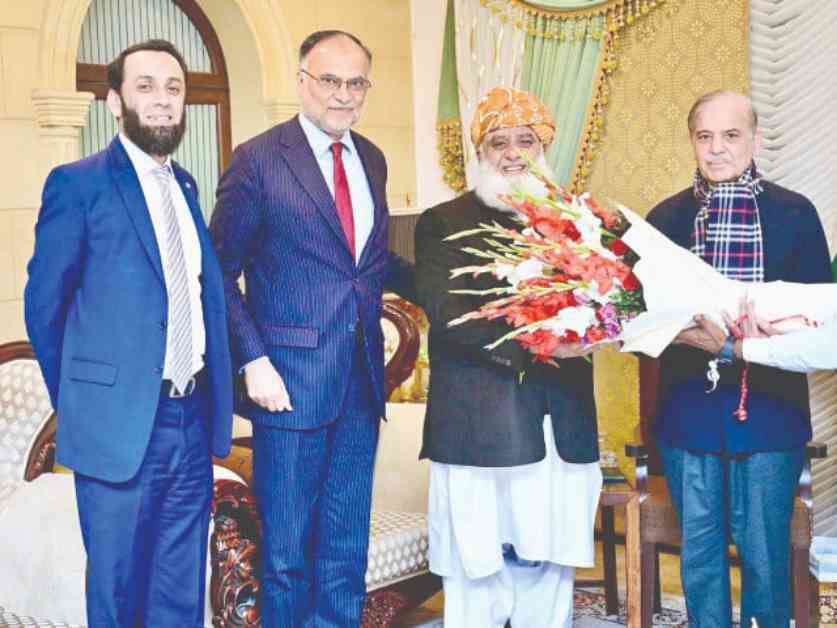Prime Minister Shehbaz Sharif’s recent meeting with JUI-F chief Maulana Fazlur Rehman has sparked public outrage following the JUI-F leader’s continued claims of a “fake parliament.” Despite Shehbaz’s attempts to mend fences with his former ally, Fazl remains steadfast in his opposition to what he deems an illegitimate governing body. This narrative has gained traction since the controversial February 8, 2024, general elections, which Fazl insists were marred by extensive rigging.
The Prime Minister’s gesture of presenting Fazl with a bouquet, captured in photographs that circulated in the media, belies the underlying tension between the two political figures. While the images depict a facade of camaraderie, Fazl’s assertion that the “fake parliament” lacks credibility has only grown more forceful. During a recent event at a religious seminary in Mardan’s Takht Bhai area, Fazl reiterated his stance, emphasizing that the public’s dissatisfaction could lead to widespread unrest.
In a fiery speech, Fazl lamented the alleged attempts by the “fake parliament” to undermine religious seminaries and impose restrictions on them, purportedly at the behest of external influences. He particularly criticized the parliament’s hesitation in enacting legislation related to the registration of these institutions, insinuating a bias against certain religious groups. Fazl’s impassioned words reflected a broader concern for the perceived threats to traditional values and religious freedoms in the country.
Moreover, Fazl’s remarks extended beyond domestic issues, touching on international affairs such as US foreign policy and the Israeli-Palestinian conflict. Drawing parallels between the plight of Palestinians and the struggles of other displaced populations in the region, he condemned what he viewed as oppressive tactics by Israeli authorities. Fazl’s vocal support for the Palestinian cause and his denunciation of illegal settlements underscored his commitment to justice and humanitarian principles.
As tensions simmered on the political front, Fazl’s unwavering stance against perceived injustices resonated with his supporters and critics alike. His defiance in the face of adversity, coupled with his emotive rhetoric, struck a chord with those who shared his concerns about the erosion of democratic norms and civil liberties. Despite his minority status in the parliament, Fazl’s ability to mobilize public sentiment underscored the enduring power of grassroots movements in shaping national discourse.
In conclusion, Fazlur Rehman’s steadfast opposition to the “fake parliament” reflects broader societal anxieties about the state of democracy and governance in Pakistan. By challenging the status quo and advocating for marginalized voices, he embodies a spirit of resistance that transcends partisan divides. As the public grapples with ongoing political upheavals, Fazl’s words serve as a reminder of the enduring quest for justice and accountability in a rapidly changing world.









